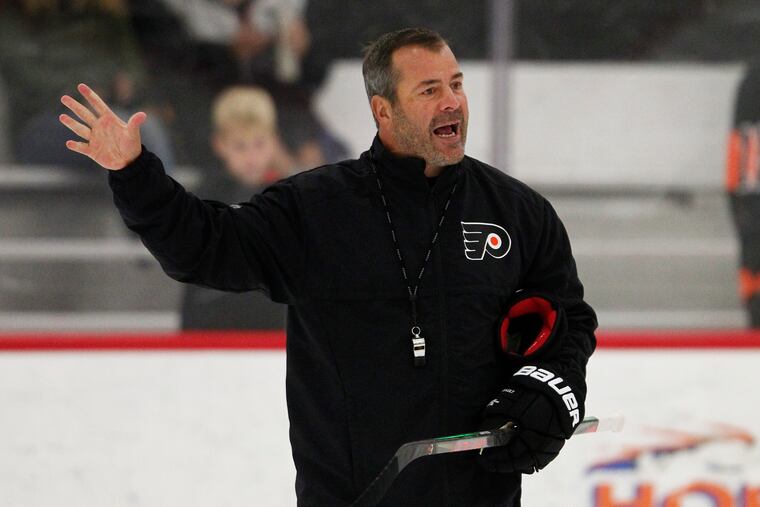Under Alain Vigneault, rest and recovery are keys to keeping Flyers fresh all season | Sam Carchidi
Fewer practices and morning skates, the Flyers coach believes, will give his players more energy throughout the season.

Things are different with the Flyers under new coach Alain Vigneault.
There’s a skills coach to help the players in various areas.
There’s a deeply respected coaching presence, thanks to Vigneault (see his demotion of turnover-plagued Jake Voracek) and his track record. That presence hasn’t been felt since Peter Laviolette was behind the Flyers bench.
There’s generally been stronger special-teams play, though the sample size is extremely small.
Oh, and there’s a difference in the practices, which have a much brisker pace.
That is, when the Flyers have practices.
Under Vigneault, the Flyers will have fewer practices and will reduce the number of morning skates this season.
“You know why I started that? Way back in my Vancouver time, it was because the media didn’t like coming down for the morning skates, so I said I’m not doing it anymore,” Vigneault said the other day.
He was kidding, of course.
The truth is, Vigneault, in consultation with strength coaches and players throughout his long and successful NHL coaching career, believes rest and recovery are important factors between games. That, he says, will lead to more energy during games and his players won’t be as apt to wear down late in the season.
“It got to the point where I felt we just had to touch the ice once between games,” he said. “Whether it was a morning skate or a practice, that’s enough.”
The Flyers won’t be “off” on days when they are not on the ice. There will be some light work in the gym, and video sessions and meetings with the coaches.
“You can do stuff off the ice that’s going to help your game,” Vigneault said. “All the arenas now have facilities where they can work on their shots and work on their puck-handling skills. But I think just once on the ice between games is good, and I’ve been doing it for quite a few years now.”
It seems to have worked. Vigneault is the 12th-winningest coach in NHL history.
Flyers center Kevin Hayes, who played for Vigneault for four years with the New York Rangers, was asked if less ice time was helpful.
“If you asked every guy, I think you’ll get a different answer,” he said. “Sometimes I want a morning skate; sometimes I don’t. It depends how the night before goes and the [previous] game. In the beginning of the season, I like the morning skates because we’re just starting to play games and just getting used to each other.”
There’s a fine line. You want your players to be sharp on the ice, but you also want their bodies to recover from the previous game and a grueling schedule. The Flyers, for instance, traveled nearly 14,000 miles to play their first five games.
“It’s a long year, and every game everyone is going all-out,” said defenseman Ivan Provorov, a workaholic in the weight room, “so I think it’s important to get your rest and recovery when you can. Sometimes, when you have a late game, like 8 o’clock, you need a morning skate, and some [game] days, you just come in for a workout in the morning, do a little warm-up, and stay off the ice.”
Many others things contribute to a speedy recovery after a game, experts say, including getting at least seven hours’ sleep a night, taking a daily nap (20 minutes is plenty), drinking lots of water to stay hydrated, and keeping your daily protein intake high.
As for morning skates, if Vigneault doesn’t hold one, he still has his reserve players attend them, but he wants his regulars off the ice until game time. Instead, he wants them in meetings. Goalies, however, have the option of participating in morning skates on game day, taking shots and getting loose if they desire, and both Carter Hart and Brian Elliott seem inclined to do just that.
Defenseman Matt Niskanen, who at 32 is the Flyers’ oldest skater, says it’s becoming a trend to reduce morning skates.
“Apparently that’s what science says is best,” he said. “I think some guys were resistant to it just because they like their routine, and I was in that camp for a while. But I’m open to this. Once you get used to it, it probably is better.”
“The game’s so fast now and so tight,” Niskanen said. “… I think you need to maximize energy as much as possible.”
And hope you have a deep playoff run that uses that energy to the finish line.